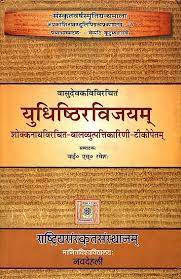In ancient Kerala there were several famous kings who called themselves Kulasekharas. Their capital was Mahodayapuram at the mouth of the Periyar River, which may be identified with modern Tiruvancikulam in Cranganore. Kulasekhara seems to have been a title assumed by the Kerala kings at the time of their coronation, for we know at least three Kulasekaharas whose proper names were different: Ravivarman Kulasekhara, patron of the famous astronomer Sankaranarayana, Ramavarman Kulasekhara, patron of the Yamaka poet Vasudeva, and Sri Kulasekhara Azhvar who may be considered as the author of Mukumdamala, are the most outstanding among them.
1.
Kulasekhara Azhvar, the Vaishnava saint was born as an
incarnation of Vishnu’s Kaustubam.
According to Vaishnava tradition, Tiruvanchikkulam is birth place
and 3075 B.C., is the year of birth of Kulasekhara Azhvar whose father
was Drudavrata, king of Kerala.
After
coming to throne, he conquered the Pandya and Cola kingdoms, and became the
emperor of the whole South India. He has
written a short and sweet devotional poem Mukundamala in Sanskrit. The language is quite simple and
natural. Owing to the great popularity
of the poem, there are various recensions of the text, each different from
others in the number of verses and in the arrangements.
2.
The royal dramatist Kulasekhara who belongs to 900 A.D., was the
author of TapatiSamvaranam and SubhadraDhananjayam. From the prologue of TapatiSamvaranam, it is
clear that he was Emperor of Kerala, that he had his capital at Mahodayapuram or
modern Tiruvancikulam. TapatiSamvaranam
is a drama with six Acts, describes the story of the love between Tapati,
daughter of the Sun-god, and Samvarana, the king of Hastinapura. The plot of the play is taken from Adiparva
of Mahabharatam.
SubhadraDhananjayam describes, in five Acts,
the well known story of Arjuna’s abduction of Subhadra, from Dvaraka. The fame of Subhadra’s beauty attaracts
Arjuna.
3. Ramavarman Kulasekhara who flourished
by about 900 A.D., who had his capital at Mahodayapuram modern
Tiruvancikulam was the patron of the Yamaaka Poet Vasudeva Kavi the author of YudhishthiraVijayam.
The YudhishthiraVijayam describes the story of the Mahabharatam in eight cantos, called Asvasas or Uchvasas, containing about one thaousand verses, mostly in the Arya metres.







No comments:
Post a Comment